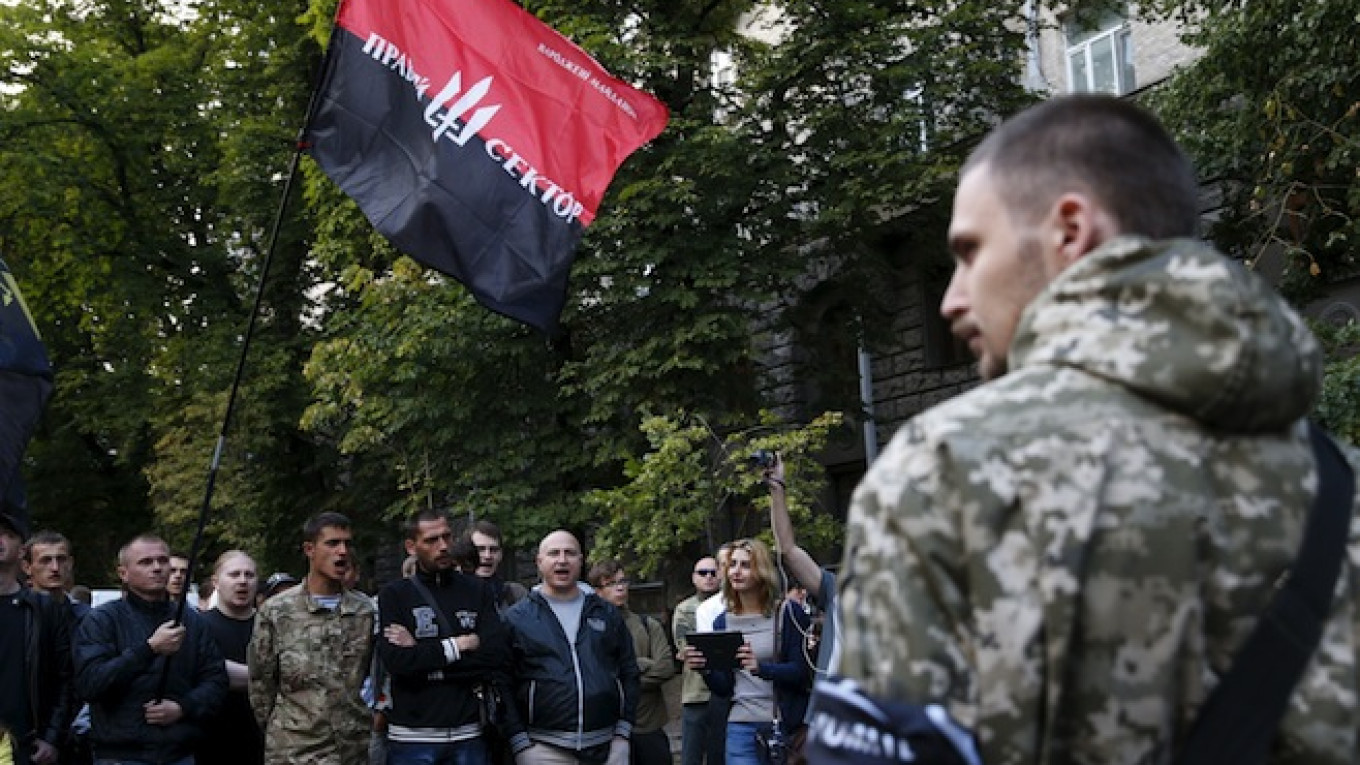KIEV — A Ukrainian far right group demanded the resignation of the interior minister and said it would block roads around Kiev on Sunday in a standoff over a fatal gun battle that challenges the authority of the government.
Kiev has called on Right Sector, which played a prominent role in protests that toppled Moscow-backed President Viktor Yanukovych a year ago, to lay down their weapons after a shootout on Saturday in the town of Mukacheve killed at least two people.
The cause of the violence is not clear. The sides have different versions of events but Right Sector's response underlines the problems Kiev has keeping order while trying to carry out reforms and crush a rebellion in its east.
Close to bankruptcy and fearful of renewed conflict with pro-Russian separatists in the east, Kiev has been criticized for being slow to reform the country's legal system, which is still described as favoring the rich and powerful.
Right Sector presented its battle in Mukacheve as one to root out corruption, saying they had been lured to a sports club in Mukacheve on Saturday by a local politician they had accused of smuggling. It said their members were set upon by local police, who killed two of their members.
Dozens of supporters of Right Sector, which is in turn hailed or blamed for injecting violence into last year's Maidan protests, also protested in Kiev and other major cities to demand Interior Minister Arsen Avakov be sacked.
In Kiev, the Interior Ministry said Right Sector opened fire first, killing one civilian, and Avakov said on his Facebook page three police officers and four civilians had been wounded in grenade attacks.
Some officials suggested the violence was a turf war between groups keen to control smuggling routes from Mukacheve, which borders Hungary, Slovakia and Romania.
On Sunday, the two sides were locked in a standoff, with Right Sector members refusing to give up their arms. Kiev sent more police to the region to try to persuade them to do so and President Petro Poroshenko ordered the police to disarm and arrest those responsible for the shooting.
Plan to Block Roads
Oleksiy Byk, a spokesman for Right Sector, said the group would set up as many checkpoints as needed to stop the flow of police reinforcements.
"We will block the roads which the police can use to send more forces to surround our comrades," he told a news conference. "These checkpoints are not to stop civilian cars but to stop the police or any other force which is being sent to reinforce ... Mukacheve."
One checkpoint outside Kiev had been set up next to a police checkpoint and was manned by two unarmed Right Sector members. They told local television they would not stop police cars.
Right Sector also said they would send their men to Kiev if Avakov was not sacked.
Analysts said the moves were a direct challenge to Poroshenko and his government, and could threaten to open up a new front in Kiev's battle to bring order to Ukraine.
"What happened in Mukacheve — this is a serious signal to the state. They must speed up moves to establish order — there must be no illegal armed groups," said Volodymyr Fesenko, an analyst at Kiev's independent Penta political research centre.
"What happened in Mukacheve is a settling of scores between criminals. It is a conflict between clans, one of which calls themselves patriots ... This is challenge to stability."
A Message from The Moscow Times:
Dear readers,
We are facing unprecedented challenges. Russia's Prosecutor General's Office has designated The Moscow Times as an "undesirable" organization, criminalizing our work and putting our staff at risk of prosecution. This follows our earlier unjust labeling as a "foreign agent."
These actions are direct attempts to silence independent journalism in Russia. The authorities claim our work "discredits the decisions of the Russian leadership." We see things differently: we strive to provide accurate, unbiased reporting on Russia.
We, the journalists of The Moscow Times, refuse to be silenced. But to continue our work, we need your help.
Your support, no matter how small, makes a world of difference. If you can, please support us monthly starting from just $2. It's quick to set up, and every contribution makes a significant impact.
By supporting The Moscow Times, you're defending open, independent journalism in the face of repression. Thank you for standing with us.
Remind me later.


